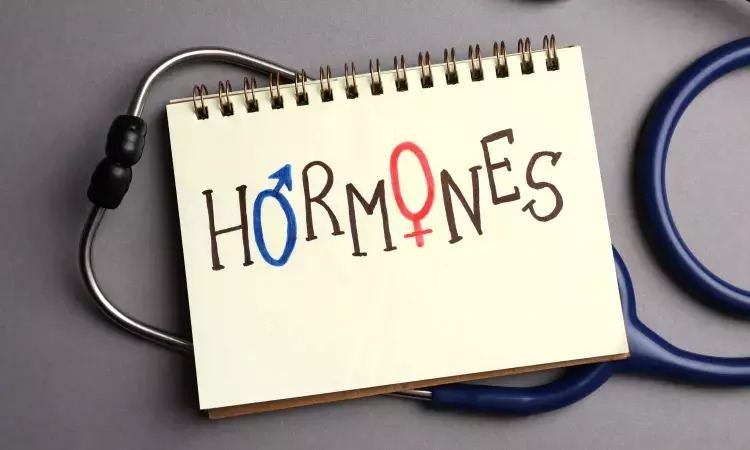- Home
- Medical news & Guidelines
- Anesthesiology
- Cardiology and CTVS
- Critical Care
- Dentistry
- Dermatology
- Diabetes and Endocrinology
- ENT
- Gastroenterology
- Medicine
- Nephrology
- Neurology
- Obstretics-Gynaecology
- Oncology
- Ophthalmology
- Orthopaedics
- Pediatrics-Neonatology
- Psychiatry
- Pulmonology
- Radiology
- Surgery
- Urology
- Laboratory Medicine
- Diet
- Nursing
- Paramedical
- Physiotherapy
- Health news
- Fact Check
- Bone Health Fact Check
- Brain Health Fact Check
- Cancer Related Fact Check
- Child Care Fact Check
- Dental and oral health fact check
- Diabetes and metabolic health fact check
- Diet and Nutrition Fact Check
- Eye and ENT Care Fact Check
- Fitness fact check
- Gut health fact check
- Heart health fact check
- Kidney health fact check
- Medical education fact check
- Men's health fact check
- Respiratory fact check
- Skin and hair care fact check
- Vaccine and Immunization fact check
- Women's health fact check
- AYUSH
- State News
- Andaman and Nicobar Islands
- Andhra Pradesh
- Arunachal Pradesh
- Assam
- Bihar
- Chandigarh
- Chattisgarh
- Dadra and Nagar Haveli
- Daman and Diu
- Delhi
- Goa
- Gujarat
- Haryana
- Himachal Pradesh
- Jammu & Kashmir
- Jharkhand
- Karnataka
- Kerala
- Ladakh
- Lakshadweep
- Madhya Pradesh
- Maharashtra
- Manipur
- Meghalaya
- Mizoram
- Nagaland
- Odisha
- Puducherry
- Punjab
- Rajasthan
- Sikkim
- Tamil Nadu
- Telangana
- Tripura
- Uttar Pradesh
- Uttrakhand
- West Bengal
- Medical Education
- Industry
Combined estrogen plus progestin not tied to increased diabetes risk in postmenopausal women

In a recent study, researchers have said that compounded HT and estrogen alone for managing menopause symptoms increases type 2 diabetes risk. However, Combined estrogen plus progestin from the manufacturer has no association with the risk of diabetes.
It is already known that MHT or Menopausal hormone therapy reduce the incidence of type 2 diabetes mellitus (T2DM). There are changes in the types and dosages of female hormones used for MHT after the Women's Health Initiative study.
In the present research, researchers determined whether MHT is associated with an increased risk of T2DM in a retrospective cohort study that included the MHT group as postmenopausal women older than 40.
This study was based on national health insurance data and cancer screening data. MHT group had five categories; tibolone, combined estrogen plus progestin by the manufacturer (CEPM), oral estrogen, combined estrogen plus progestin by the physician (CEPP), and transdermal estrogen.
Non-MHT group had postmenopausal women who never used MHT ( 2002 to 2019).
The study results are:
- The MHT and control groups had 330,771 women and 798,550 women, respectively.
- The percentage of T2DM diagnosed in the non-MHT group, tibolone group, CEPM group, oral estrogen group, CEPP group, and transdermal estrogen group was 15.2 %, 16.6 %, 12.1%,16.6 %, 15.4 % and 17 % respectively.
- Tibolone, oral estrogen, CEPP, and transdermal estrogen increased the incidence of T2DM.
- The CEPM group had no change in the T2DM risk.
Concluding further, MHT, including tibolone, the most prescribed agent, increased the risk of T2DM in this study.
Based on the study's findings, CEPM did not increase the risk of T2DM.
They said, "Only tibolone increased the risk of T2DM in participants among those who are older than 70 years."
Further reading:
Yuk, Jin-Sung MD, PhD1; Kim, Jung Min MD, PhD2. Menopausal hormone therapy and the risk of type 2 diabetes mellitus: Health Insurance Database in South Korea–based retrospective cohort study. Menopause 30(5):p 497-505, May 2023. | DOI: 10.1097/GME.0000000000002170
BDS, MDS in Periodontics and Implantology
Dr. Aditi Yadav is a BDS, MDS in Periodontics and Implantology. She has a clinical experience of 5 years as a laser dental surgeon. She also has a Diploma in clinical research and pharmacovigilance and is a Certified data scientist. She is currently working as a content developer in e-health services. Dr. Yadav has a keen interest in Medical Journalism and is actively involved in Medical Research writing.
Dr Kamal Kant Kohli-MBBS, DTCD- a chest specialist with more than 30 years of practice and a flair for writing clinical articles, Dr Kamal Kant Kohli joined Medical Dialogues as a Chief Editor of Medical News. Besides writing articles, as an editor, he proofreads and verifies all the medical content published on Medical Dialogues including those coming from journals, studies,medical conferences,guidelines etc. Email: drkohli@medicaldialogues.in. Contact no. 011-43720751


